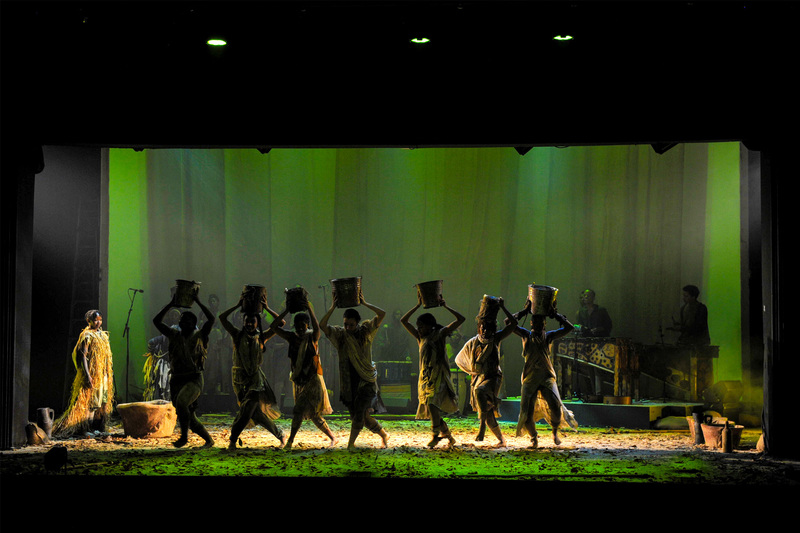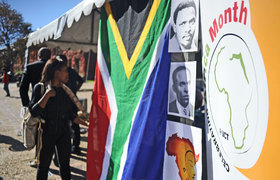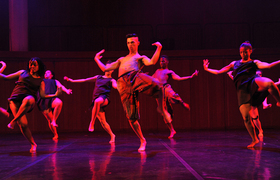‘Unxano’ sends a powerful message about water scarcity
30 May 2025 | Story Myolisi Gophe. Photos Lerato Maduna. Voice Cwenga Koyana. Read time 6 min.
As part of the University of Cape Town’s (UCT) Africa Month celebrations, a haunting yet deeply moving and entertaining performance at the Little Theatre on Hiddingh campus drew audiences into a world where water is no longer a right, but a distant memory.
THIRST – “Unxano”, a powerful African contemporary dance and music theatre production, weaves together the urgent narrative of drought, forced migration, and survival in a world of growing water scarcity.
Directed and choreographed by Maxwell Rani, with musical direction by Keketso Bolofo and Nomapostile Nyiki, the performance was staged by the South African College of Music (SACM) and the Centre for Theatre, Dance and Performance Studies (CTDPS) on 23 and 24 May.
The work, performed in multilanguage to embrace the different languages spoken in South Africa, drew standing ovations, with the audience clapping and singing along for its visceral storytelling and stirring symbolism.
A call from the earth
Set in a parched land, the performance follows a group of people driven by an elemental desperation: the need for water. Through evocative movement and live music using indigenous African instruments, the performers take the audience on a journey through famine, disease, displacement, and resilience.
“The idea was to make people feel the urgency of the issue,” said Maxwell Rani, a senior lecturer at CTDPS, whose creative vision brought the production to life. “The message is simple but powerful: never underestimate the value of water. We take it for granted until it’s gone.”
Rani, a seasoned performer and educator, is known for blurring the boundaries between African dance, contemporary storytelling, and social commentary. In this production, he draws on decades of experience teaching and performing locally and internationally to guide a new generation of artists toward socially conscious work.
Beyond performance: A living classroom
For the Nyanga-born Rani, THIRST – “Unxano” was not only a production but a pedagogical moment. The cast was made up of second-, third-, and fourth-year students from UCT’s CTDPS, many of whom had never worked on a production of this scale and urgency. “They came with raw talent, and they left with a sense of purpose. They learned how to translate complex issues like water scarcity and migration into a language of movement that speaks louder than words.”
The collaboration between departments at UCT – music, theatre, dance, and performance – made for a production that was at once technically refined and emotionally raw. The inclusion of traditional African music, composed and performed live under the direction of Bolofo and Nyiki, gave the performance both weight and soul.
“Music and dance are inseparable in African storytelling. They are not just forms of entertainment, but they carry memory, knowledge, and protest.”
Storytelling as resistance
The production draws on both the real and the symbolic. As global warming intensifies with people reportedly dying in big numbers in Eastern Africa, and urban centres like Johannesburg and cities in the Eastern Cape increasingly experiencing water rationing, the themes of THIRST – “Unxano” feel less like fiction and more like a foreshadowing of what’s to come. Cape Town itself narrowly avoided “Day Zero” during a water crisis from 2015 to 2018, making the production’s location particularly poignant.
“Taking away that freedom of just running to our water bottles after a run made us think deeply about how water is really a significant part of our everyday lives.”
In one unforgettable scene, performers act out the migration of entire communities in search of water, evoking images of climate refugees. “The main message is that you must never underestimate the power invested in water. Because once we ran out of water, it’s the end of the nation. People are dying, migrating, losing their homes,” Rani said. “Water shedding is like load shedding. Life becomes bad when there is no water. We have to talk about this. Art must carry the conversation.”
A vision for the future
Rani said the overwhelmingly positive reception to the show has prompted discussions about future performances and collaborations. He hints at possibly taking the production on tour to schools in disadvantaged communities and invite residents. “That can instil the importance of water because in our townships in almost every corner there is a carwash, and water is just pumping out with no one [being] accountable for it. It’s not the end. It’s the beginning of a conversation. The message needs to reach more people.”
One of the cast members was Khanya Tasana, a second-year BA student in theatre and dance performances, whose home in Khayelitsha is opposite a car wash. She reflected on the powerful and transformative process of preparing for the show.
“I think that process was very impactful, and it opened my eyes in a lot of ways, in the sense that now I believe that people around the world, and South Africa, don’t really understand the significance of water until it’s taken away from them.”
She said during rehearsals they used to dance and run for two hours and weren’t allowed to drink water, to get the realism out and to feel how it is to live without water. “Taking away that freedom of just running to our water bottles after a run made us think deeply about how water is really a significant part of our everyday lives. I really appreciate everything this production has brought. It was hard work, but a really successful and powerful experience.”
 This work is licensed under a Creative Commons Attribution-NoDerivatives 4.0 International License.
This work is licensed under a Creative Commons Attribution-NoDerivatives 4.0 International License.
Please view the republishing articles page for more information.






































